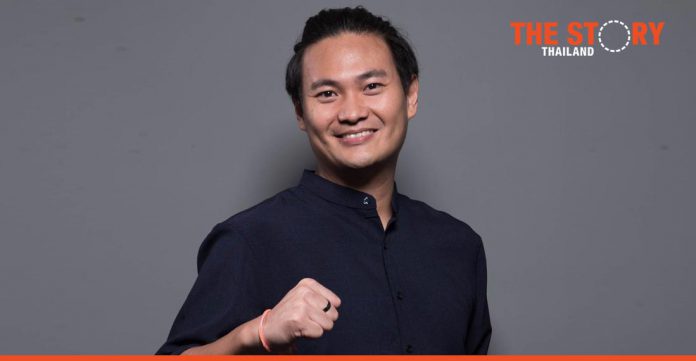Virtual queuing app finds opportunities in COVID-19 crisis
While many businesses in Thailand have had their performance severely impaired by the COVID-19 pandemic, the locally-based virtual-queuing system provider QueQ has set an example of how best to survive.
Before the pandemic, QueQ deal mainly with restaurants, allowing its users to join table queues with the remote touch of a button. But in the strict lockdowns and temporary closures of big shopping malls, as authorities scrambled to stop the spread of the disease, QueQ saw its app usage plummet. It immediately began racing against the time to adjust its services in response to changing consumer behavior. Now, QueQ is able to facilitate take-home orders and food deliveries.
The co-founder and Chief Executive of Queue Q (Thailand), Rungsun Promprasith, told The Story Thailand that COVID-19 had brought both threats and opportunities. When the pandemic struck, QueQ began transferring staff, cutting expenses and postponing investments so as to “extend its runway”.
The move, Rungsun said, gave his firm a better chance to tap into new markets. As the coronavirus threat escalated, many places needed to implement social-distancing measures.
National parks, for example, had to limit the number of visitors based on their available space. QueQ responded by enabling reservations for people planning a trip to the parks.
This month, QueQ began to provide a novel solution to a fresh market in Chiang Mai, with hopes that the solution will soon be introduced to other fresh markets in eight northern provinces. The solution creates a system by which the density of people at the market can be managed, paving the way for collaboration on social distancing between municipalities and market operators.
In addition, the solution offers users a drive-through function. Customers do not need to physically enter the market and walk around. They can opt to use the app and receive all of the goods they order from a “runner”. Orders and payments can be made via QueQ.
With this solution, the markets also have to change. For example, they need to set standard prices – or as close to standard as possible – changing from the old practice of different vendors charging different prices for similar products. University students have been offered part-time work as “runners”. They can choose how they are paid, receiving either a daily wage or payments based on the number of “runs” they do.
- From e-book business to Thailand’s largest digital-content ecosystem
- Thai venture capitalists grow more cautious
“We are launching this solution at the Na Pratu Mueang Chiang Mai Market first, before expanding it to other fresh markets,” Rungsun said, “It takes just one day to install and implement our system”.
He said that QueQ planned to develop such a system, even before the COVID-19 crisis. When it was founded in 2015, QueQ intended to develop apps first for restaurants, then for banks, and then for hospitals. As the platform gathered its feet, it would be adapted to work with other businesses as well.
In effect, the COVID-19 crisis has expedited the implementation of QueQ’s business plan. With the app development completed, the next steps are about marketing and generating the biggest impacts possible.
“We already have more than two million users,” Rungsun said. “We hope the number will rise beyond four million.”
QueQ aims to enable social distancing
Rungsun said it was clear that QueQ’s main features could serve the needs of various businesses. Now, his firm has decided to develop new features to meet the needs of specific customers. For example, QueQ’s work with national parks has led to it gathering information from visitors, enabling easy reporting and forwarding of information to relevant authorities. Such information can be used by government agencies to plan how to efficiently deal with tourists and will prove to be useful to the public.
However, Rungsun was quick to point out that QueQ does not store personal information. It is therefore “more than ready” to welcome any investigation, should it be accused of abusing personal information. He added that the Digital Economy Promotion Agency (depa) is a shareholder of QueQ.
“We are going to use our app strengths to serve new markets. Our app can be adjusted to suit local environments, and we will make sure each area or each market receives greater benefits from our platform,” he said.
Functioning as an SME, focused on profits
Rungsun said Thailand was very lucky that the COVID-19 situation had eased rapidly, paving the way for the reopening of shopping complexes and related businesses. QueQ’s usage has thus returned to services, as customers need to book seats in compliance with social-distancing measures.
Beauty salons, spas, and clinics have resumed operations with adjusted business models. Hospitals, which need to prevent overcrowding, and national parks that need to properly manage visitor density, are turning to QueQ to accept reservations.
However, there have been other impacts for QueQ, as foreign investors have postponed their investments. The new round of capital-raising was scheduled to conclude in June, but foreign investors postponed their decision-making. QueQ has thus decided to accept investments from any interested investor until additional-capital limits for this round are met. After that, contracts of capital acceptance will be turned into shares.
Rungsun regards as “regrettable”, the decision by investors to suspend any investments for the time being. As a result, QueQ has accepted the need to move “step by step” in expanding into foreign markets.
“Our firm has adjusted its strategies mainly to generate cash flow. Functioning as an SME instead of startup for now, we are implementing profit-oriented strategies,” he said.





